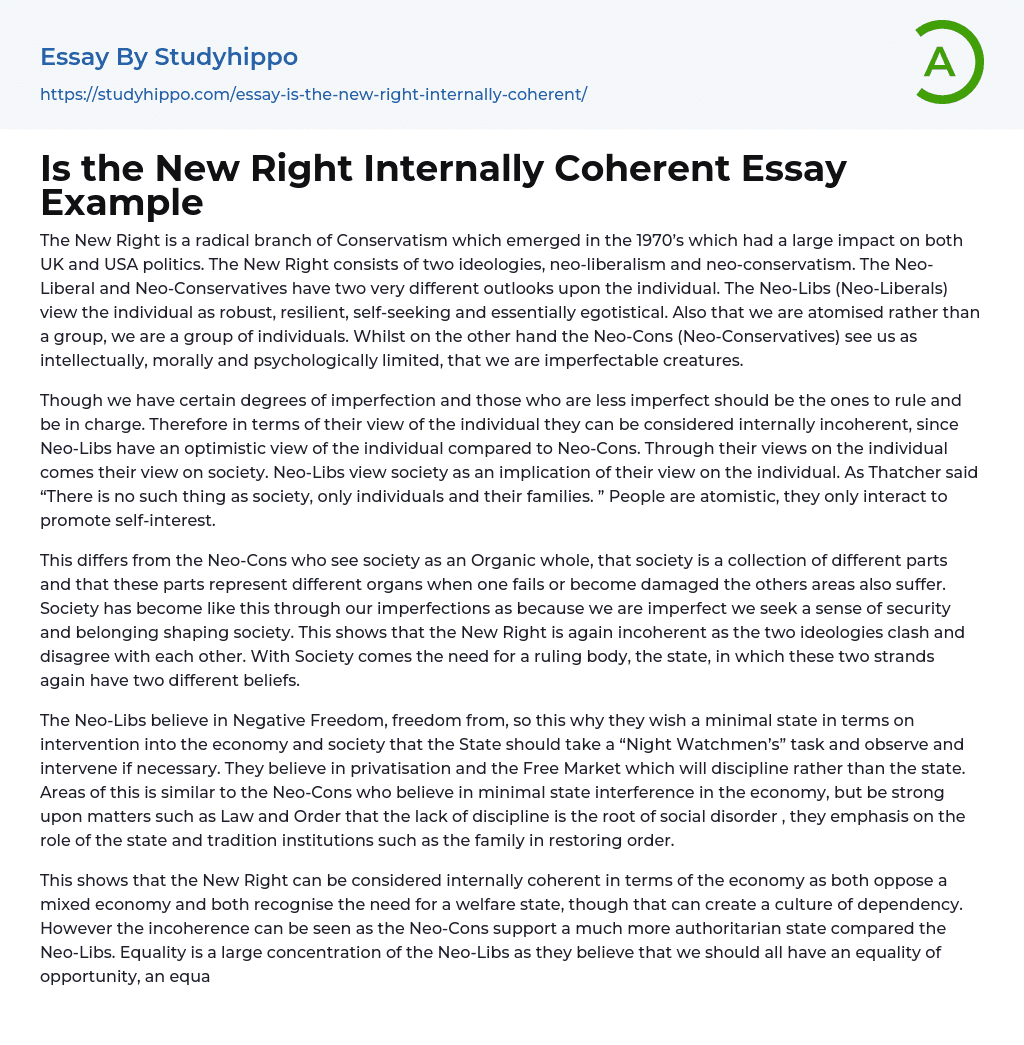The New Right is a radical branch of Conservatism which emerged in the 1970’s which had a large impact on both UK and USA politics. The New Right consists of two ideologies, neo-liberalism and neo-conservatism. The Neo-Liberal and Neo-Conservatives have two very different outlooks upon the individual. The Neo-Libs (Neo-Liberals) view the individual as robust, resilient, self-seeking and essentially egotistical. Also that we are atomised rather than a group, we are a group of individuals. Whilst on the other hand the Neo-Cons (Neo-Conservatives) see us as intellectually, morally and psychologically limited, that we are imperfectable creatures.
Though we have certain degrees of imperfection and those who are less imperfect should be the ones to rule and be in charge. Therefore in terms of their view of the individual they can be c
...onsidered internally incoherent, since Neo-Libs have an optimistic view of the individual compared to Neo-Cons. Through their views on the individual comes their view on society. Neo-Libs view society as an implication of their view on the individual. As Thatcher said “There is no such thing as society, only individuals and their families. ” People are atomistic, they only interact to promote self-interest.
This differs from the Neo-Cons who see society as an Organic whole, that society is a collection of different parts and that these parts represent different organs when one fails or become damaged the others areas also suffer. Society has become like this through our imperfections as because we are imperfect we seek a sense of security and belonging shaping society. This shows that the New Right is again incoherent as the two ideologies clash and disagre
with each other. With Society comes the need for a ruling body, the state, in which these two strands again have two different beliefs.
The Neo-Libs believe in Negative Freedom, freedom from, so this why they wish a minimal state in terms on intervention into the economy and society that the State should take a “Night Watchmen’s” task and observe and intervene if necessary. They believe in privatisation and the Free Market which will discipline rather than the state. Areas of this is similar to the Neo-Cons who believe in minimal state interference in the economy, but be strong upon matters such as Law and Order that the lack of discipline is the root of social disorder , they emphasis on the role of the state and tradition institutions such as the family in restoring order.
This shows that the New Right can be considered internally coherent in terms of the economy as both oppose a mixed economy and both recognise the need for a welfare state, though that can create a culture of dependency. However the incoherence can be seen as the Neo-Cons support a much more authoritarian state compared the Neo-Libs. Equality is a large concentration of the Neo-Libs as they believe that we should all have an equality of opportunity, an equal chance to rise. This is different to the equality of outcome which Socialists believe in.
The Neo-Libs believe in meritocracy, where those who try hard and do well are rewarded for their efforts and through this no one has a fixed social position. In argument for evidence is that Thatcher was the daughter of a Greengrocer but
thought her effort and merits was able to become Prime Minister. This differs from the Neo-Cons who believe that society is set out in a natural Hierarchy, therefore there are those who lead and there are those who follow with fixed social grades.
Therefore the New right is incoherent in its view of equality because Neo-Libs emphasise the ability of anyone to prosper if they work hard, whilst Neo-Cons have more of a fixed view of social status. Though there is some coherency as neither support equality of outcome. Whilst there are elements of similarity such as their desire for the Free Market, it is fundamentally incoherent as it is based upon two different ideologies. Each Ideology emphasises core principles which oppose each other, hence so does each strand of the New Right. This is evident in their view upon the individual, Society, the State and equality.
- Values of Life essays
- Ethical dilemma essays
- Normative Ethics essays
- Virtue Ethics essays
- Belief essays
- Deontology essays
- Moral essays
- Virtue essays
- Work Ethic essays
- Business Law essays
- Contract essays
- Consumer Protection essays
- Property essays
- Ownership essays
- Agreement essays
- Common Law essays
- Contract Law essays
- Justice essays
- Security essays
- Tort Law essays
- United States Constitution essays
- Crime essays
- Lawsuit essays
- Treaty essays
- Family Law essays
- Marijuana Legalization essays
- Constitution essays
- War on Drugs essays
- Court essays
- Jury essays
- Police essays
- Protection essays
- Community Policing essays
- Criminal Law essays
- Judge essays
- Lawyer essays
- Employment Law essays
- Copyright Infringement essays
- Injustice essays
- Intellectual Property essays
- Breach Of Contract essays
- Jurisprudence essays
- Social Injustice essays
- Juvenile Justice essays
- Internet Privacy essays
- Cyber Security essays
- Bill Of Rights essays
- Civil Liberties essays
- First Amendment To The United States Constitution essays
- Fourth Amendment To The United States Constitution essays




